Slits - Interview
by John Clarkson
published: 13 / 1 / 2010
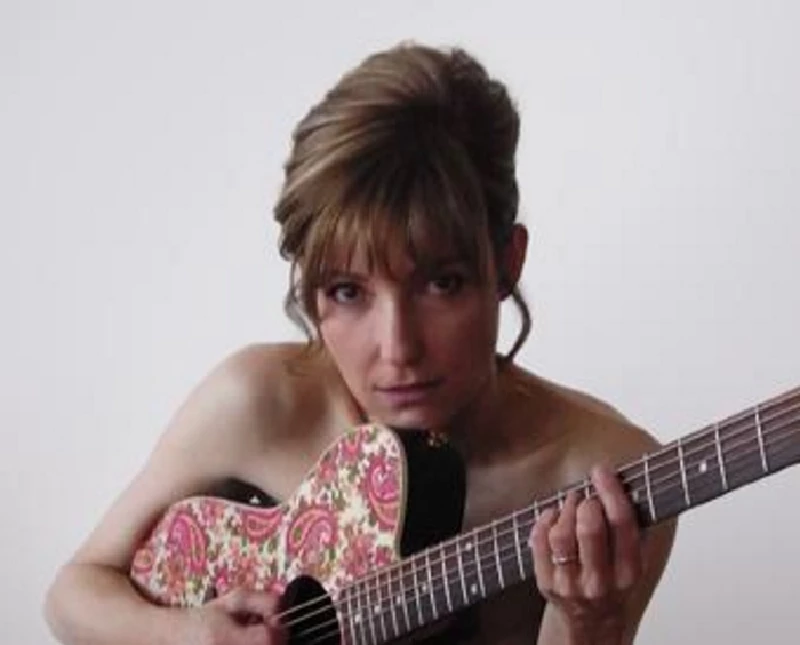
intro
The guitarist and main songwriter in the 70s punk act the Slits, Viv Albertine recently returned to making music after an absence of nearly thirty years. She speaks to John Clarkson about her former band and her new EP
Viv Albertine was the guitarist and main songwriter in the Slits. Under-acknowledged in their lifetime, the Slits, who formed in London in 1976, have only in recent years come to be recognised as one of the most original-thinking and important of the initial wave of British 70’s punk acts. For many years, they were best remembered for a controversial photo on the sleeve of their 1979 debut album, ‘Cut’, which depicted Albertine, bassist Tessa Pollitt and the group’s teenage vocalist Ari Up naked from the waist up and caked like Amazons in mud as they defiantly eyed the camera. In the male-dominated and often misogynist record industry of the 70s and even amongst many of their fellow punks, the always wilful and predominantly female Slits were seen as menacing, their emphasis on what was simply united girl identity being misinterpreted as hardcore feminism. Their music and philosophy is now acknowledged as being ahead of its time. While they initially thrived on raw amateurism, ‘Cut’, which was released on Island Records and produced by the reggae musician Dennis Bovell, merged punk sounds, dub beats and African tribal rhythms with Ari Up’s woozy, often atonal singing. The group’s second studio album, ‘Return of the Giant Slits’, took this even further, and, released in 1981 just weeks before the Slits split up, added jazz textures. Recent years have, however, been much kinder to the Slits. The group were adopted in the early 90s as the foremothers of the Riot Grrrl movement. While both the CBS-released ‘Return of the Giant Slits’ and an untitled and almost unlistenable 1980 album of early demos and live recordings remain largely forgotten, ‘Cut’ has been through various reissues and was re-released in 2009 in a 30th anniversary double CD package. The Slits were also the subject of a long overdue retrospective last year in a book, ‘Typical Girls?: The Story of the Slits’, written by journalist Zoe Street Howe. Although the Slits’ revival has been astonishing, perhaps even more remarkable has been the renaissance of Viv Albertine. Albertine, a one-time flatmate of Sid Vicious, and the former girlfriend of the Clash’s Mick Jones, recently returned to making music after an absence of nearly thirty years in which she focused instead on a career in TV directing and most recently motherhood. She played two shows in late 2008 with the Slits, which had reformed in 2006 with both Ari Up and Tessa Pollitt still in the line-up, but left them after that to focus on a solo career. During the last few months she has toured America as a support act to the reformed Raincoats and played regular shows in London and on the south coast of England. She will be returning to America to play SXSW in March and also in May will be playing the Matt Groening-curated All Tomorrow’s Parties Festival. ‘Flesh’, a four track EP and Albertine’s first recording of new material since ‘Return of the Giant Slits’, is also due out shortly on Sonic Youth front man Thurston Moore’s Ecstatic Peace!label. A combination of skewed guitar noises, wonky studio effects and bittersweet mantras and tunes, it speaks of unfulfilled yearnings, sexual frustrations and disillusionment in the whole ideal of romance. Other tracks on the web, such as ‘Confessions of a MILF’, a condemnation of the confinements of marriage and motherhood, are equally convincing and reveal again that three decades later Viv Albertine has lost none of her ability for spiky wit or ear for twisted melody. In an interview with Pennyblackmusic, she spoke about her re-emergence. PB: You started playing solo gigs last summer and have the ‘Flesh’ EP out soon. Why did you decide to return to song writing now? VA: It wasn’t really a decision. It was more a question of timing. I was asked to go back into the Slits about three or four years ago and I absolutely said no. No way. I didn’t feel that it was relevant at all, but then they asked me again about a year ago and something had shifted in the world and in its openness, exactly like back in the 1970s. I felt back in the 1970s, and 1976, that a little crack had opened where it didn’t matter if you couldn’t play music or if you weren’t a musician. There was a chance back then for anyone to have a go. People are once again much more open. You’ve got young music fans now who will like everything across the board. They don’t judge by age or style of music. They will like Leonard Cohen or Four Tet or whoever. It is partly a mind set and there is also partly this DIY thing with home recording and the internet. Things don’t feel the same because they have moved on, but the same opportunities and the same openness are there again, and I saw that crack open up for me (Laughs) and I went through it again. When the Slits asked me once more to play some songs with them, I picked up the guitar again. I had not touched it for twenty five years. I had actually sold my guitars at auction and I was sort of plonking away at it and thinking, “Maybe I can do this again”, and then Zoe Street Howe came to interview me for her book about the Slits and she was so gorgeous and bright and young and totally into the Slits as a relevant thing that that became another factor. When Tessa Pollit said, “Oh, you’ve got to meet this girl Zoe about the book” I went plodding off to the station to meet her thinking, “Oh no. What kind of girl is going to be writing about the Slits? That happened thirty years ago.” But she was just so alive and bright and so enthusiastic about the Slits that that became another incentive. PB: You only, however, played two dates with the Slits. Why did you decide after that not to do any more shows with them? VA: The Slits said that that I had four months to prepare before going back on stage with them again. It was something ridiculous like that. It was like that programme,‘Faking It’, and I really worked at it every single day. There were occasions when my daughter would be out doing sports and I would be in the car playing the guitar while watching her. I absolutely went for it. Meanwhile I had also started doing open mics all along the South coast near where I now live in Hastings and, not only did the guitar playing come out, but also the songs came pouring out. New songs came absolutely bursting out of me like a volcano, so by the time I went on stage with the Slits I had been doing all these months of playing open mics, doodling away out of tune, but playing stuff which meant the world to me. When it came to being on stage with the Slits, I just felt awkward. PB: Why was that? Did it just no longer feel appropriate singing songs like ‘Shoplifting’ which you had written in your early twenties? VA: Yes, that was part of it. ‘Shoplifting’ was most embarrassing (Laughs). It was great playing it. I loved all my guitar parts. The guitar parts were fantastic. I didn’t feel embarrassed about that, but I felt awkward singing songs like that. As half the songs in the set were Ari’s new songs, there were also all these other songs which I felt no kinship with as I hadn’t been a part of her band. I knew that I didn’t feel awkward being on stage because I felt awkward being on stage. I was fine when I was doing my own stuff which felt so honest and true. I knew then that it was a matter of the material being wrong. PB: You have said about when you started writing songs again that “I realised that I was living out other people’s previous expectations, not my own.” What did you mean by that? VA: It is just so hard in this world to be yourself. My little girl is ten and I have seen with her from year zero the pressures that come crowding in for a person from the minute they are born. Partly it is in the obvious ways-toe the line, be nice, be that sort of girl, be that sort of boy. But even by the time you get to my age it still exists and the weight of it was really dragging me down. I don’t know if it was because I am by nature a pleaser or because I am a female, but even me, even the sort of rebellious, wild girl that I was and still am, was being crushed by it, trying to live that perfect dream, have the perfect family, be the perfect wife, the perfect partner, and lead the perfect life. PB: ‘Confessions of a MILF’ is about the trappings of motherhood and marriage. Was that just a reflection on your state of mind at that time? How many of your songs are based on personal experience and how much on what you have observed? VA: Every song is an amalgamation of many things. It is a mixture of a lot of things. I don’t want to break it down into this bit is what I feel and this bit is what I observed. It is enough to say though that I broke down sobbing after I wrote that song and that every time I sing it that it makes tingles go through me. It came out of a ten page rant that I wrote down and it is absolutely real. Everything that I write really comes back to the Slits. We were very strict, as were a lot of punks although we didn’t call ourselves back then, that every note that you played and every word that you wrote had to be true and I still hold to that maxim. That song has cut to the heart of many people who have seen me play it live or heard it. The other day I played it at a gig and one guy in particular came up to me afterwards and he said to me, “I am an artist and do you think really that an artist and a family can’t go together?” It had affected him because there is a line in it which says “I chose being an artist over being a wife.” I am so pleased about that because when I started up again I made my mind up I was going to write the absolute truth. Even up against quite a lot criticism from amongst people close to me, I was going to ignore it and if didn’t affect people and they didn’t hear it then I was going to stop. PB: There are four songs on the ‘Flesh’ EP. Why did you choose these particular songs for that EP? VA: I recorded them last February. It was the first solo recording I had ever done and it just came together really well. I worked with Dylan Howe (Jazz drummer, session musician and member of the Blockheads-Ed) and we worked brilliantly together. We went into the studio and just put down those four songs. I had plenty to choose from, but those four songs seemed the most ready. I was wondering whether to release them or not and Thurston Moore from Sonic Youth heard them and he said, “This so needs to be documented and not let go. They have to go out there.” He offered to release them on his Ecstatic Peace! label. I was in a very heartfelt stage when I wrote about them and thinking about love a lot. PB: It comes across as fairly scathing about most aspects of love (Laughs). VA: Yeah (Laughs). When I played that gig the other night, I said, “Like a true punk I still don’t believe in love.” It was very uncool to believe in love then, but actually it is not that I don’t believe in love. It is just that I have held out for so long for this wonderful ideal of love, this sort of soul mate thing and I am beginning to think that it is a complete con. You can only hold on for so long and then you just have to get real and to get on with it. I have held out probably long enough for that really. PB: You had two early teachers for the guitar in Keith Levene (The Clash, Public Image Limited-Ed) and Mick Jones. What do you think they both taught you and how much of that have you carried on into the music you are making now? VA: Mick didn’t teach me anything. I was already his girlfriend by then. If you are having sex with someone, they don’t teach you anything. They’ve got where they want to go (Laughs), but Keith taught me so much. He loves teaching anyway. He has got so much patience and enthusiasm for someone who can’t play a note even now. He is probably the most sensitive person that I have ever met in my life to the point where it is actually quite painful for him because he can feel any vibe in a room. He can understand people’s thoughts before they have even thought them. He is an extraordinary person and then he takes that into his guitar playing. He taught me not so much this chord and that chord and bar chords and that sort of thing. He taught me to relate to the guitar as something to put my feelings through. He taught me how to have a relationship with the guitar. He totally liberated that instrument for me to make me feel like I had no boundaries with it. It didn’t matter that I couldn’t play, that I had never had a music lesson in my life. It was just Viv Albertine improvising with another person almost. That guitar was almost like another person. That is something I still do with my guitar playing. I had not touched a guitar for all that time, over twenty five years, but as soon as my fingers warmed up I let go. It was quite hard to do, but as soon as I did this passionate, thrashing and ringing sound came back. I was so pleased about that because it made me realise that the way that I played before wasn’t a mannerism. It was actually me because it had come back all these years later, the same kind of sounds, the same sort of atonal ringing, the slightly Eastern thing, that emphasis on the top three strings. It all came back without me having to think about it. PB: Is it true that you initially turned down the Slits, but had a change of heart after seeing them play their first gig? VA: Yes (Laughs). It was a very small scene in those early days. None of us were feminist in an organised way and I wasn’t interested in being in a band that was all girls for a gimmick. They were also quite rowdy and I was quite subdued at that stage and just didn’t think that it was my sort of thing at all. Then I saw them play and I just thought they were electrifying on stage. I thought that Ari’s presence was amazing and absolutely free and abandoned. Palmolive’s playing (Original Slits drummer, replaced in 1978 by Budgie and then latterly by Bruce Jones-Ed) was completely wild and she was so engaged and vibrant on stage. I was totally smitten by them and I rang them up either that night or the next morning and apparently they were laughing in the background and saying, “Oh, she’s interested now” (Laughs), which I was unaware of. Then we got together for a rehearsal and I don’t know why, but Kate Korus, the original guitarist, wasn’t there and we totally clicked. I showed them the one song that I had at that point written and we played it and it worked out well. From that moment onwards that was it. PB: The Slits did two early Peel Sessions. On those you sound pretty raw, but by the time of ‘Cut’ you sound much more polished. How much of that was down to Dennis Bovell’s production and how much of that was down to the fact that while you had always had ideas in abundance you had just simply improved as musicians? VA: We turned down record deals for a year and a half because we couldn’t play what we heard in our heads. It was all very conscious. We were very wilful girls who knew what we wanted. We were four of a kind really and waited and waited until we were ready and eventually got the label which we wanted which was Island. They suggested Dennis and we clicked with him. He has got a fantastically broad knowledge which was great. He’s not just a reggae guy. He loves rock. He loves pop. He loves it all and knows it back to front and when we got together it was at one level like a fifth member had come in, bringing in this massive input. At the same though he himself says in the Slits biography that he completely just interpreted what was already there. The Slits had it all. We had the melodies. We had the backing vocals. We had the structure of the songs. None of that was changed, but he came along and did the job of a producer. He’s absolutely spoilt me though because to have Dennis Bovell as your first producer who comes along and does magic, that makes you love your own stuff even more it is like having your first boyfriend be your best lover and then you can never find anyone who will match up to it again. PB: For ‘Cut’ you were able to gain complete artistic control which was very unusual for any group to do that in the 70s, but especially for a band that was made up of girls. How did you manage to wangle that? VA: I don’t know. I don’t know if I remember it being unusual. We just expected it. We were just so militant and so wild (Laughs) and so absolutely driven with our own vision that is what we expected. PB: Don Letts says in the Slits biography that “pioneers never reap the rewards.” It never seems to be very much acknowledged but both Madonna and Cyndi Lauper in the mid 80s with all their chiffron and lace seemed to have largely lifted your own individual fashion sense of three or four years beforehand. Is that something which amuses you, annoys you or does it just not bother you? VA: Oh, God! All my life since I was about thirteen it has always been like that. I have always had girls copying me. The only annoying thing is when it has happened in bands as well who have then gone on to have more success than us (Laughs). I don’t obviously mind Madonna and Cyndi Lauper. They only nicked a few fashion ideas. Who doesn’t? I am nicking off them now probably (Laughs). PB: ‘Return of the Giant Slits’ is a very under rated album. It was released on a much bigger label than Island in CBS. It is even more of a diverse album than ‘Cut’ was, yet it has never received that same acknowledgement and has never been through the same reissue campaigns. Why do you think that is? VA: I don’t know. Maybe Island is slightly more aware than CBS. CBS was probably so big and has got so much to choose from that they have never found it again. It would need some kind of fan type campaign. People have told me that they like the songs on that ‘Return of the Giant Slits’ even more than ‘Cut’. They’re really out there. I listened to a few of them recently and I had never listened to that material for years and I thought, “Wow! They are really different. Why aren’t they being used in films or something like that?“ Usually people who are looking for music for films do a lot of research. I just can’t believe that they haven’t come across it. PB: Ari Up was pregnant when the Slits ended. How much of that was a factor in the break up of the band and how much of it was just sheer burn out? VA: We have probably all got a different story about why we broke up. I don’t know what Ari would say. I would say that it was a big factor though. It is quite a big thing being pregnant especially at that age as well. It is all encompassing and distracting. While she would say that she didn’t want the band to split up, it is difficult to really things keep together if someone is mentally not there. The other thing is that the times had really changed. Thatcher came in and Wham! were top of the charts. Margaret Thatcher made everything including music into a business. When you think of how different music was for us in the 70s we had nothing. We were all scratching around the streets. We had nothing to do. There was nothing on TV for youth. There was no youth culture. No one had even a home telephone. We lived in squats. We never called each other. We just turned up randomly on people’s doorsteps after travelling an hour and a half across London. We had no job we wanted to do. Music was everything to us and then suddenly it was a business and there is Wham! all clean and carrying briefcases to meetings. It was not a medium that was worth being in anymore. PB: Have you been surprised at how quickly things have picked up for you since you returned to music? VA: I have. Every day when I started again I would sit there at the kitchen table playing the guitar, and every single day and every minute of it I would think, “I am mad. I have seriously lost the plot. What am I doing?” Then when I went out and did the open mics I was absolutely rubbish at first, but the songs were there. I think people would hear the songs and the honesty that was there. I had no technical ability when I first started to play, but every night at least one person would come up to me and be knocked out beyond belief. Even with my rubbish warbling and playing, they were touched to the core and that just kept me going. Things have just built and built organically from there. I go through plateaux. It doesn’t feel like it has gone like a graph up and up. I have worked with people and it has gone wrong and I have been devastated and had to start all over again and the only thing that I have got is that I have been through it before and I can recognise the patterns now. PB: Where do you go from here? Is the next thing an album? VA: It has got to be an album. I think that I am going to try to build up my audiences as well. I am also going to tour a bit more this year. I played some dates in America last year supporting the Raincoats and will be going back there to do SXSW and some dates on the west coast in March. In Britain I have mainly just played London and the south coast and I also want to do more dates up north. Things can still go horribly wrong, but nothing fazes me, absolutely nothing. I have had glasses explode by my face. I have been out there in the past showered in gob all night long. I have opened my mouth and it has gone into my mouth, my eyes, dripped down my sleeve. I have had fights with people in the front row, whacked them with my guitar because they were trying to pull Ari off the stage. There have been Hell’s Angels in the audience, so what is going to faze me? People say to me, “How come you are so relaxed?”, but I have had the training from hell. I feel like I am sitting on the edge of the bed in my bedroom when I am on stage. I am more comfortable there than anywhere else in the world. I think that it is because it is the one place on earth that a girl can be transgressive and I think that is the core why so many girls even now want to be famous. Even now girls are so restricted and constricted and that is the one arena where it is allowed because on stage you can be sexy, you can shake your arse, you can shout what you want to say and show off. PB: Thank you very much.
Band Links:-
http://www.slitsdoc.com/https://en-gb.facebook.com/slitsdoc/
https://en.wikipedia.org/wiki/The_Slits
Picture Gallery:-
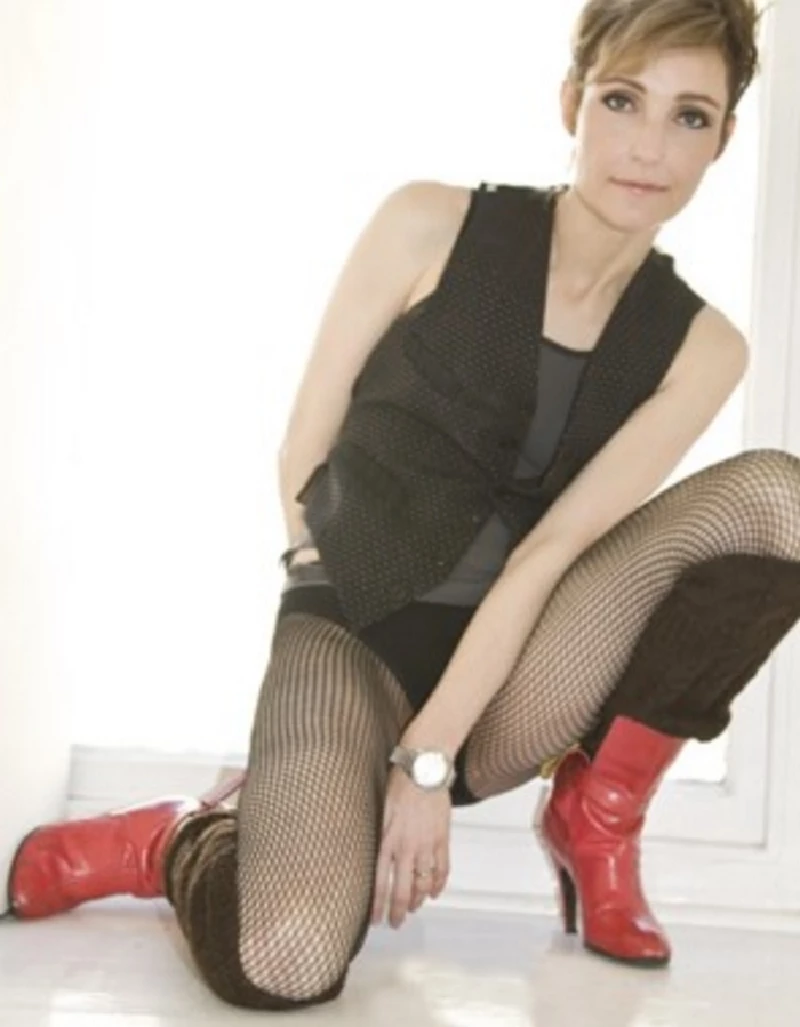
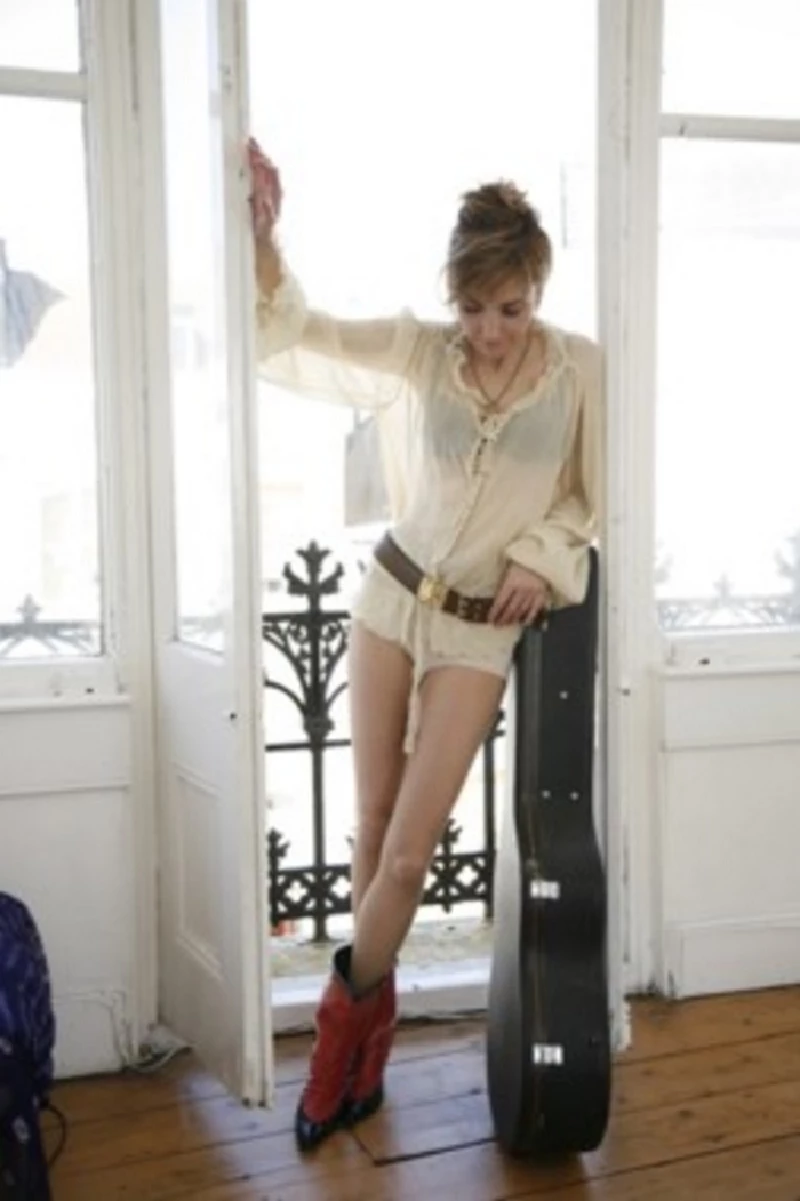
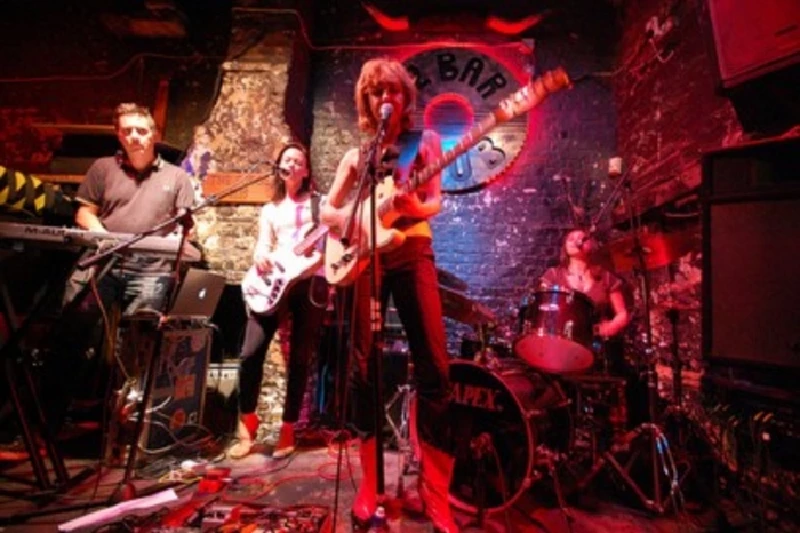
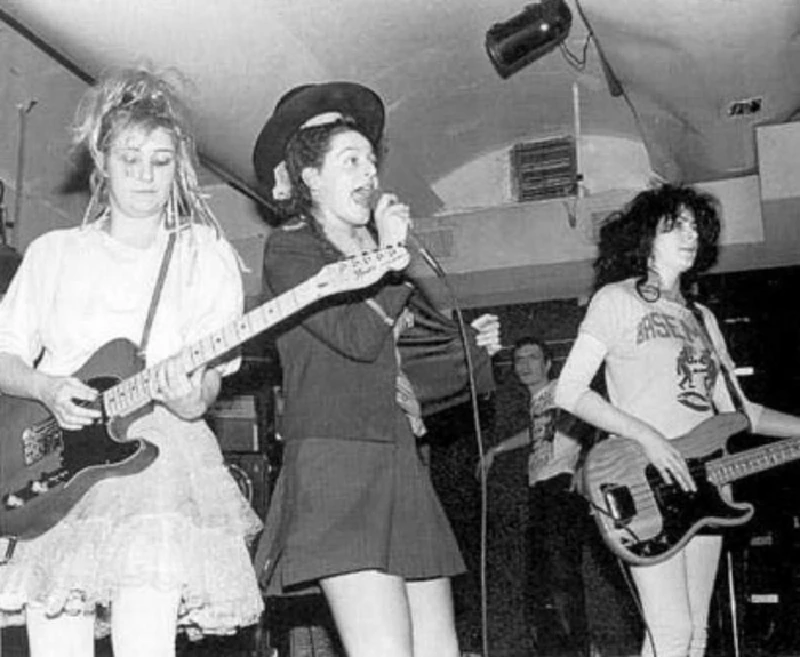
Visitor Comments:- |
| 390 Posted By: fuckwit, catford on 16 Jan 2011 |
|
let it go to ones head.
Nice. guitar, crossed leg, naked. achieved?
Nice pose. bad sounds now though whats going to be your saving grace. living in an era of so called decadence that merged into real world of the middle class playiing the down trodden anti-hero. if it gets you this far well done. just and female not ahead of your own time. but now playin to the male expectation. well done.
|
interviews |
|
Interview (2018) |
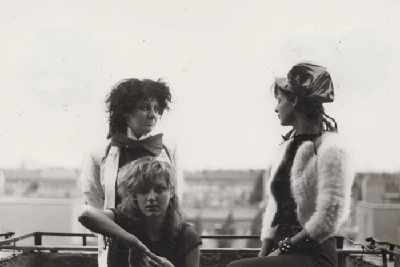
|
| John Clarkson talks to Tessa Pollitt, the former bassist with seminal all-girl punk band The Slits, about the new film documentary 'Here to Be Heard: The Story of The Slits’, and its accompanying scrapbook. |
| Interview with Ari Up (2005) |
profiles |
|
Here to Be Heard: The Story of the Slits (2018) |
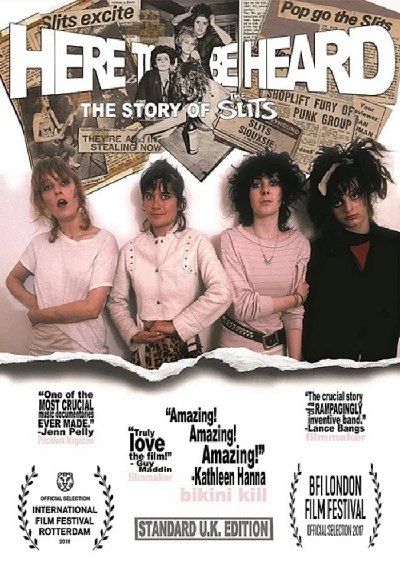
|
| Nicky Crewe finds that a new revealing and entertaining documentary about the Slits will remind fans of just how special they were. It is bound to inspire a new generation too. |
| 1962-2010 (2010) |
live reviews |
|
ABC2, Glasgow, 9/5/2010 |
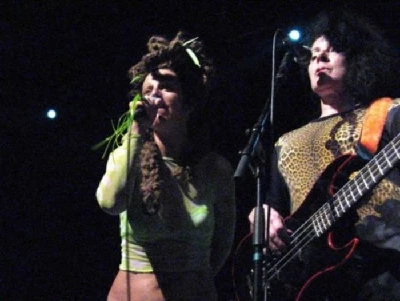
|
| At the ABC2 in Glasgow, Tony Gaughan finds all-female punk/reggae act the Slits to have lost none of their fieriness or sense of fun in an energetic set to promote 'Trapped Animal', their first album in over twenty years |
most viewed articles
current edition
Carl Ewens - David Bowie 1964 to 1982 On Track: Every Album, Every SongArmory Show - Interview with Richard Jobson
John McKay - Interview
Colin Blunstone - Thalia Hall, Chicago, 16/7/2025
Billie Eilish - O2 Arena, London, 10/7/2025
Bathers - Photoscapes 1
Loft - Interview
Visor Fest - Valencia, Spain, 26/9/2025...27/9/2025
Sir Tim Rice - Interview
Robert Forster - Interview
previous editions
Manic Street Preachers - (Gig of a Lifetime) Millennium Stadium, Cardiff, December 1999Heavenly - P.U.N.K. Girl EP
Beautiful South - Ten Songs That Made Me Love...
Peter Perrett - In Dreams Begin Responsibilities Interview Part One
Boomtown Rats - Ten Songs That Made Me Love....
Oasis - Oasis, Earl's Court, London, 1995
Coldplay - Wembley Arena. London, 16/8/2022
Trudie Myerscough-Harris - Interview
Prolapse - Interview
Pixies - Ten Songs That Made Me Love...
most viewed reviews
current edition
Davey Woodward - Mumbo in the JumboSick Man of Europe - The Sick Man of Europe
Lucy Spraggan - Other Sides of the Moon
Phew, Erika Kobayashi,, Dieter Moebius - Radium Girls
Suzanne Vega - Flying With Angels
Bush - I Beat Loneliness
Amy Macdonald - Is This What You've Been Waiting For?
Alice Cooper - The Revenge of Alice Cooper
Blueboy - 2
Cynthia Erivo - I Forgive You
Pennyblackmusic Regular Contributors
Adrian Janes
Amanda J. Window
Andrew Twambley
Anthony Dhanendran
Benjamin Howarth
Cila Warncke
Daniel Cressey
Darren Aston
Dastardly
Dave Goodwin
Denzil Watson
Dominic B. Simpson
Eoghan Lyng
Fiona Hutchings
Harry Sherriff
Helen Tipping
Jamie Rowland
John Clarkson
Julie Cruickshank
Kimberly Bright
Lisa Torem
Maarten Schiethart